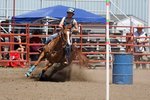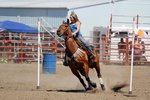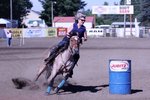


During the last weekend in June the temperature in Clark County crept over 100 degrees at times, but the blazing heat failed to deter the horse enthusiasts who gathered at the Clark County Saddle Club for the Legends Saddle Series.
Riders smeared on handfuls of sunscreen and took frequent gulps of water to combat the heat, but they also paid close attention to their four legged companions, knowing that when the sun is bearing down it’s important certain measures are put in place for the proper care of horses.
To find out how horse owners should care for their animals when the weather turns a tad more balmy than the hoofed of Clark County are comfortable with, The Reflector turned to an expert.
Debby Williams has owned and trained horses at Kozy-Manor Stables in Ridgefield for more than 27 years and has been a part of the equestrian community almost her whole life. She is currently a Two-Star Parelli instructor. She offered three simple tips and a few tricks she’s learned during her career for helping one’s horse beat the heat.
Hydration
Horses will drink a lot of water during warmer parts of the year and to help keep that drinking water clean, Williams does something she describes as “totally weird.”
She plants goldfish in the water tanks to keep mosquitoes from laying eggs and fostering larvae.
Given that they hibernate through the winter, Williams said adding a little fish management is fairly easy — just feed them.
Along with making sure horses have plenty of water during the heat, Williams said you can mix electrolytes into either the horse’s water or food and there is also electrolyte paste that can be applied directly into their mouth.
Rinsing them off
When it gets hot out, many horse owners rinse their animals off with the hose to cool them down. According to Williams, one needs to be careful when doing this.
“If you shock their overall body with cold water it can be bad,” she said.
Instead, the focus needs to be on cooling down their blood system. She advises one use a slow stream through the hose and to concentrate on certain areas of their body.
“You cool them down by putting the cold water on their legs,” Williams said. “Then the blood circulation goes throughout their body and cools them slowly.”
‘Flip their turnout’
When the temperature is going to be above 90 degrees Williams will “flip their turnout,” meaning she puts them out at night when it's cooler.
The combination of the heat with limited shade in most places and relentless horseflies can quickly begin to irritate horses.